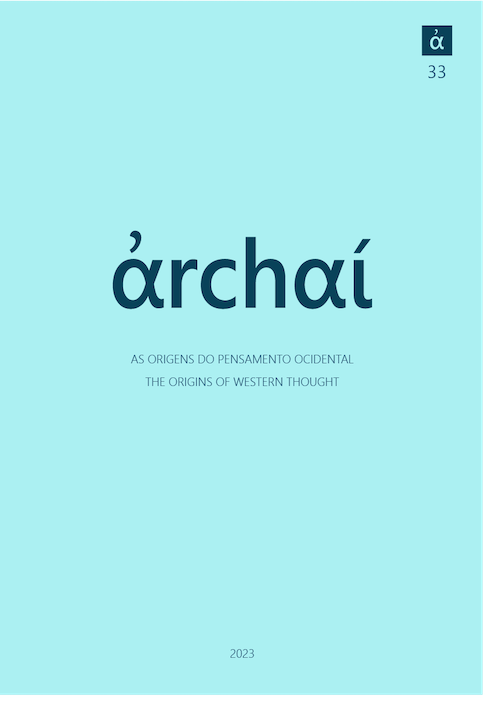The plane tree and the singing cicadas in Plato’s Phaedrus: the environment of dialogue
DOI:
https://doi.org/10.14195/1984-249X_33_17Keywords:
Philosophy, Plato, Nature, rhetoric, cicadasAbstract
This article aims to rethink the meaning of “nature” and the human in Plato, more specifically through some examples contained in the Phaedrus, a rare dialogue further away from the city. Phaedrus and Socrates leave Athens on a path outside the walls, past the Ilisus stream and the breeze of the woods, and end up sitting in the shadows of trees full of singing cicadas. What is the meaning of this scenario in the construction o the text? Is it possible to learn from oak trees or insects? The philosophizing of this dialogue passes through the coolness of the shadows of the trees in the hot summer noon. This sensuous topography through the text reveals the writer Plato wary of the enveloping meaning of the living drama between Phaedrus and Socrates. The audience and participation of natural elements, trees and cicadas in the dialogue reveals an involvement of the discourse with the surrounding atmosphere, a special concern of Socrates in his palinode and in his final prayer to Pan. In this dialogue, more than distinct and removed from nature, we think the human being (and reason) immersed in it - in an attempt to integrate a mythological and dialogical search between river, rock, plants, animals, humans, gods and demigods. The image of an overly rationalist and humanist Plato finds in this text a perspective of an inspired writer, a hybrid poet and philosopher, with a mission to restore language and the city to animal and cosmic life.
Downloads
References
BÁDENAS, P. (1985). La vida y Fábulas de Esopo Madrid, España. Editorial Gredos.
CASERTANO, G. (2008). A verdade platônica entre lógica e páthos. Anais de Filosofia Clássica 2, n. 4, p. 1-18.
COOPER, J. M. (1997). Plato Complete Works. Indianapolis; Cambridge, Hackett Publishing Company.
CORNELLI, G. (2018). A Felicidade Perdida: Animais que falam e a ontologia da cidade platônica. In: SEBASTIANI, B.; LEÃO, D.; SANO, L.; SOARES, M.; WERNER, C. A poiesis da Democracia Coimbra, Imprensa da Universidade de, p. 477-488.
CORREA, P. (2007). O Canto da Cigarra. Kléos 11/12, p. 23-32.
FERRARI, F. (1987). Listening to the Cicadas: A study of Plato’s Phaedrus Cambridge, Cambridge University Press.
SIQUEIRA DE AZEVEDO FILHO, D. (1990). O mito das Cigarras (um canto de ironia). Revista Contexto , n. 5, p. 31-45.
GOMES, P. (2000) Platão. Fedro ou da Beleza Lisboa, Guimarães Editores.
GRISWOLD, C. L. (1996). Self-Knowledge in Plato’s Phaedrus New Haven and London, Pennsylvania State University Press.
HACKFORTH, R. (1952). Plato’s Phaedrus Cambridge, Cambridge University Press .
JAEGER, W. (1994). Paideia: a formação do homem grego Tradução de Artur M. Parreira. São Paulo, Martins Fontes.
KAHN, Charles. (1996). Plato and the Socratic Dialogue: the philosophical use of a literary form. Cambridge, Cambridge University Press .
LEVEN, P. (2015) Mythologies of the Voice: Plato’s Cicadas and the Nature of the Voice. Society for Classical Studies, Available at https://classicalstudies.org/annual-meeting/146/abstract/mythologies-voice-plato%E2%80%99s-cicadas-and-nature-voice. Accessed in 05/06/2021.
LIDDEL, H. G.; SCOTT, R.; (2001) A Greek-English Lexicon. in: CRANE, R. G. (ed.) Perseus Digital Libray Tufts University, Available at: http://www.perseus.tufts.edu. Accessed on 18/04/2022.
LOPES, R.. (2011). Platão. Timeu-Crítias Coimbra, Centro de Estudos Clássicos e Humanísticos.
LÚCIA, A..; THEREZINHA, M. (2009). Hesíodo. Teogonia Niterói, Editora da UFF.
MARDER, M. (2012). The Philosopher’s Plant 1.0: Plato’s Plane Tree. Available at: project-syndicate.org/blog/plato-s-plane-tree. Accessed on 26/03/2021.
NUNES, C. A.. (2011). Platão. Fedro Belém, Editora UFPA.
NUSSBAUM, M. (2004). La Fragilidad del Bien Madrid, Antonio Machado Libros.
OLIVEIRA, A. M. (2012). A psicologia de Platão: sobre a teoria da alma humana no diálogo Fedro, a partir das categorias do apolíneo e do dionisíaco. Plêthos 2, 1. p. 176-196.
PEREIRA, I.. (1998). Dicionário Grego-Português e Português-Grego Braga, Livraria A.I - BRAGA.
PORATTI, A. (2010). Platão. Fedro Madrid, Madrid, Ediciones Akal.
SANTOS, M. C. A. dos. (2019). À sombra do Plátano - comentário sobre o mito escatológico do Fedro de Platão. Revista de Estudos Filosóficos e Históricos da Antiguidade 24, n. 33, p. 53-72
SOUZA, J. C. (trad.) (2016). Platão. Fedro Posfácio e notas José Trindade dos Santos. São Paulo, Editora 34.
TRABATTONI, F. (2012). Myth and Truth in Plato’s Phaedrus . In: COLLOBERT, C.; DESTRÉE, P.; GONZALEZ, F. (eds.). Plato and Myth: studies on the use and status of platonic myths Leiden; Boston, Brill, p. 315-447
ZASLAVSKY, R. A. (1981). A hitherto Unremarked Pun in the Phaedrus. Apeiron 15, n. 2, p. 115-6.
Downloads
Published
How to Cite
Issue
Section
License
Copyright (c) 2023 Henrique Gomes Guimarães

This work is licensed under a Creative Commons Attribution 4.0 International License.
Given the public access policy of the journal, the use of the published texts is free, with the obligation of recognizing the original authorship and the first publication in this journal. The authors of the published contributions are entirely and exclusively responsible for their contents.
1. The authors authorize the publication of the article in this journal.
2. The authors guarantee that the contribution is original, and take full responsibility for its content in case of impugnation by third parties.
3. The authors guarantee that the contribution is not under evaluation in another journal.
4. The authors keep the copyright and convey to the journal the right of first publication, the work being licensed under a Creative Commons Attribution License-BY.
5. The authors are allowed and stimulated to publicize and distribute their work on-line after the publication in the journal.
6. The authors of the approved works authorize the journal to distribute their content, after publication, for reproduction in content indexes, virtual libraries and similars.
7. The editors reserve the right to make adjustments to the text and to adequate the article to the editorial rules of the journal.



